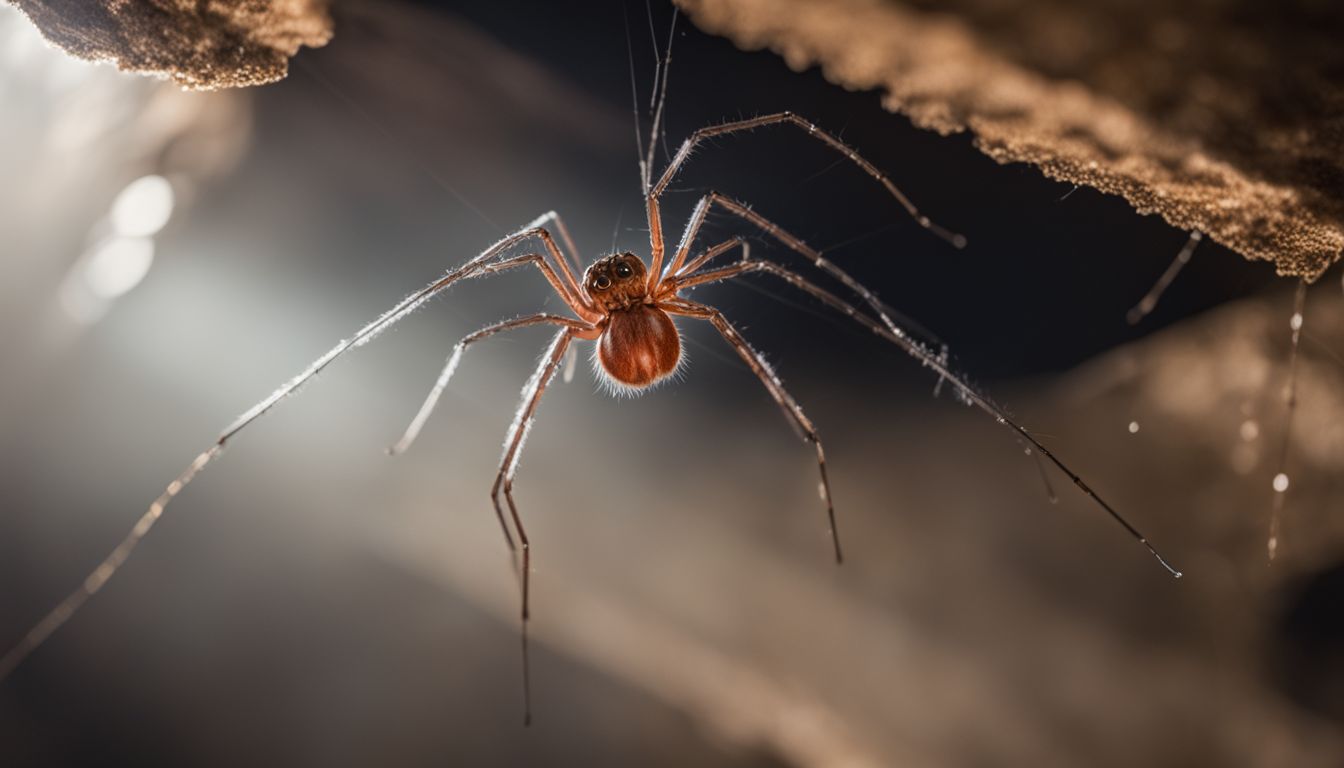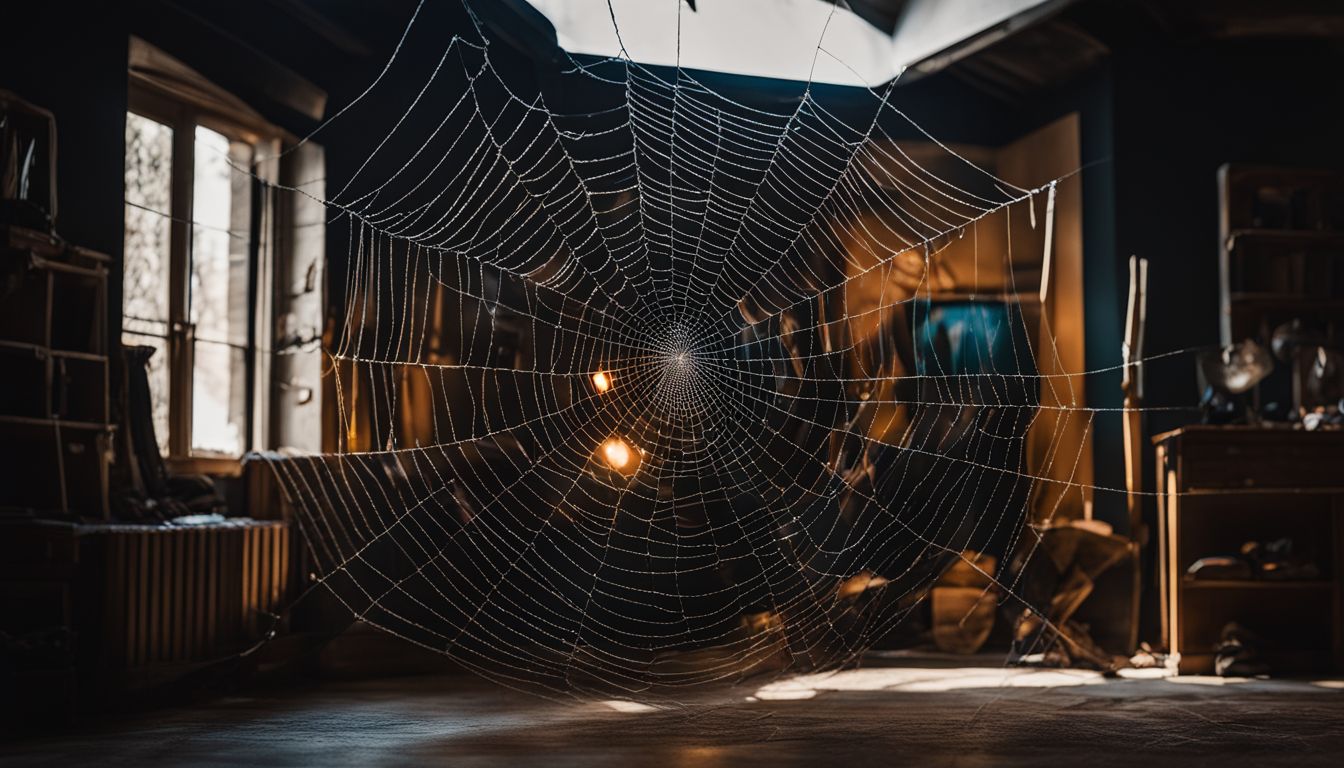Are you spotting more spindly-legged spiders in your basement than you’d like? Cellar spiders, or ‘daddy longlegs,’ are common houseguests and quite the web-weavers. Our guide is here to arm you with safe and effective methods to clear these critters out of your home.
Keep reading for simple spider solutions!
Key Takeaways
- Cellar spiders can be kept away by regular cleaning, removing webs and egg sacs, and eliminating clutter to reduce hiding spots.
- Sealing entry points using caulk, repairing window screens, and installing door sweeps help in preventing cellar spiders from entering the house.
- Lowering humidity with a dehumidifier or improving ventilation, along with using natural repellents like essential oils and diatomaceous earth, are effective ways to repel cellar spiders without harsh chemicals.
- If natural remedies fail, safe use of insecticides and perimeter treatments can provide long-term control for persistent cellar spider infestations.
Identifying Cellar Spiders in Your Home

Once you know about cellar spiders, spotting them in your home is the next step. These spiders often have skinny bodies and very long legs, making them easy to spot on walls or ceilings.
They aren’t just one color; they can be pale yellow, light brown, or gray. Look for their messy webs in quiet corners of basements and behind furniture. Their webs don’t stick like others do because cellar spiders keep building new ones instead of cleaning up old ones.
Cellar spiders sometimes hang upside down inside their web when they wait for bugs to catch. Also, check less busy places like storage areas and crawl spaces where these spiders love to live quietly without being disturbed.
Keep an eye out for small cobwebs in upper corners or cluttered spaces that might tell you a spider moved in!
Understanding What Attracts Spiders to Your House

After spotting cellar spiders in your home, it’s important to know why they came. Spiders don’t just show up for no reason; they are on the lookout for food and a cozy place to stay.
Little bugs are like snacks for spiders, so if you have many insects inside, spiders will come. They love quiet spots where they can make webs and lay low without being disturbed.
Keeping your house clean is key to not inviting these eight-legged guests. Make sure there’s no food lying around that might bring smaller bugs which attract spiders. Watch out for dark corners, closets, or any messy places since spiders find these very comfortable.
Fix any leaks too because spiders really enjoy damp places with high humidity to call home. Cut down clutter as well—fewer things laying around means fewer hiding spots for both insects and spiders!
Effective Strategies to Eliminate Cellar Spiders
Regular cleaning and web removal, sealing entry points, and reducing humidity and clutter are all effective strategies to get rid of cellar spiders. Read on to discover more natural remedies and preventative measures for a spider-free home.
Regular Cleaning and Web Removal
Cellar spiders don’t like clean homes. Sweeping and vacuuming can keep them away.
- Start by getting rid of spider webs. Use a broom to reach every corner of your rooms.
- The Cobb Webb Duster head works great for cleaning out spider homes. It’s made just for this job.
- Make sure to clean often, especially in corners and hidden spots. Cellar spiders like these places.
- Use a vacuum to suck up spiders, their webs, and egg sacs. This is a quick way to clear them out.
- Focus on places where walls meet the ceiling. These spots are where cellar spiders often hang out.
- After you clean, throw away the bag right away. This stops the spiders from coming back out.
- Keep your home free of clutter. Spiders love to hide in piles of stuff.
- Without webs and hiding spots, spiders will have no place to live in your house. They’ll go somewhere else.
Sealing Entry Points
Cellar spiders can enter your home through tiny openings. Seal these points of entry with caulk to keep them out. Here’s how:
- Use a caulking gun to seal cracks and crevices around doors and windows.
- Check for gaps around pipes, vents, and cables entering the house, and seal them with caulk or weather-stripping.
- Repair damaged window screens to prevent spiders from crawling in through torn areas.
- Place door sweeps on exterior doors to close the gap between the bottom of the door and the threshold.
- Install mesh screens on vents to prevent spiders from entering through these openings.
Reducing Humidity and Clutter
After sealing entry points to prevent spiders from entering your home, the next step is to tackle the issue by reducing humidity and clutter. Here’s how you can do that:
- Lower the relative humidity in your home using a dehumidifier or by improving ventilation in areas where cellar spiders are present. This will make those areas less attractive to insects, which are the spiders’ food source.
- Conduct a thorough cleaning of your home, especially in areas where cellar spiders are commonly found, such as basements and garages. Remove clutter, dust regularly, and vacuum to eliminate webs and egg sacs.
- Pay attention to dark and damp areas like basements and crawl spaces. Fix leaks promptly to prevent moisture buildup, as high humidity attracts insects that cellar spiders feed on.
- Store firewood and other items away from the exterior walls of your home to reduce hiding spots for spiders and their prey.
- Install weather stripping around windows and doors to keep out both spiders and their potential meals.
- Consider using yellow or sodium vapor light bulbs outdoors as they are less attractive to insects, which in turn reduces the spider’s food source.
Natural Remedies and Preventative Measures
If you prefer natural or DIY methods, there are various options available to repel and prevent cellar spiders from invading your home. Some of these include using essential oils as repellents and utilizing diatomaceous earth as a non-toxic way to control spider populations.
Essential Oils as Repellents
Essential oils like peppermint, tea-tree, lavender, and rose are popular for keeping spiders away. Thyme oil, sandalwood oil, and clove oil also work well as spider repellents. Lavender essential oil not only deters spiders but also repels fleas, flies, mosquitoes, and ticks.
Citrus oils such as lemon, orange, and lime are effective at warding off spiders too. However, it’s important to note that essential oils need regular reapplication since they don’t have long-lasting effects against insects.
When using these oils for spider control in your home or cellar where you’ve spotted the pests previously; make sure to apply them frequently to maintain their effectiveness. Also remember that additional research is required to confirm the efficiency of other essential oils in deterring spiders from invading homes.
Utilizing Diatomaceous Earth
Diatomaceous Earth is a natural and effective solution for getting rid of spiders and other insects. It works by absorbing the oils and fats from their exoskeleton, causing them to dry out and die.
This product is safe for use around pets and humans, although inhalation can irritate the eyes and nose. When used properly, diatomaceous earth can exterminate pests like bed bugs, cockroaches, fleas, poisonous spiders, and ticks.
Additionally, it serves as a natural spider repellent without the need for chemical products.
Chemical Treatments for Persistent Infestations
When natural remedies and preventative measures are not effective in eliminating cellar spiders, chemical treatments may be necessary. Safe use of insecticides and perimeter treatments can provide long-term control of persistent infestations.
Perimeter Treatments for Long-Term Control
After learning about the safe use of insecticides, now let’s delve into perimeter treatments for long-term control to keep cellar spiders and other pests at bay. Here are effective methods you can consider:
- Perimeter applications like Supreme IT Insecticide can be used every 90 days to deter cellar spiders and other insects from entering your home.
- Implement termiticide applications around the perimeter, as they are beneficial in controlling cellar spiders and other pests.
- Apply band treatments using sprays and dusts around the outside foundation wall perimeter and into the lawn to prevent spiders from venturing indoors.
- Regularly maintain the treatment to ensure long – term protection against cellar spiders and other pests.
Conclusion
In conclusion, getting rid of cellar spiders requires regular cleaning and sealing entry points. Using essential oils as repellents and diatomaceous earth can also help keep them away.
For persistent infestations, safe insecticides and perimeter treatments are effective solutions to control the spider population in your home.
If you’re dealing with wolf spiders as well, find out what lures them into your home by reading our guide on what attracts wolf spiders to your house.
FAQs
1. What are cellar spiders?
Cellar spiders, often called daddy long legs or harvestmen, are a type of spider with very long, thin legs. They belong to the Pholcidae family and like to live in cool, damp places.
2. Can cellar spiders hurt me like brown recluses do?
No, cellar spiders can’t bite humans because their mouths are too small. Unlike brown recluses whose bites can be harmful, cellar spiders don’t pose a threat from bites.
3. How can I keep cellar spiders out of my house?
To keep these arachnods away use integrated pest management (IPM) techniques such as cleaning up clutter and sealing cracks where they might enter your home.
4. Are there natural ways to get rid of cellar spiders?
Yes! Using peppermint oil around areas where you see them may help since many pests do not like the smell and it’s a part of pest control without harsh chemicals.




